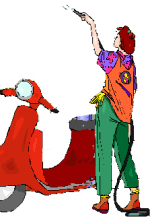
Let's go!


Conditionals
The conditional is a type of grammar which is used to explain consequences. A conditional says that if something is true, then something else will be true also.
For example
If you are reading this, you are using a computer.
You can see that from this conditional that I know you are reading this, and because this is on an internet website, you can't read it without a computer. so I know that because you are reading this, you are using a computer. In the same way I can say:
If you were born before 1957, you are over 50 years old.
I know this is true, because it is not possible to be born before 1957 and NOT be over 50 years old. So being over 50 years old is a consequence of being born before 1957. You will see that the sentence does not say that you are over 50 years old, or that you are born before 1957, but it does say that if the first part of the conditional is true, then the second part is also true. To give one last example, I might say:
If your English is perfect, you can stop reading now.
So ask yourself, 'Is my English perfect?' No? Then the first part of the conditional is not true, so the second part is not right either. Keep reading!
The conditonal has two parts - the if clause, and the result clause. The if clause asks 'Is this true?' and the result clause says 'Well, if the first part is true, then this is true as well.'
For example
If you eat too much, you will feel ill.
The 'if' clause does not say you will eat too much, but the result clause says that if you do eat too much, this will be the consequence.
Something else to remember about the grammar of the conditional is that there are usually two clauses, and they can come in any order. So you can have a result clause first and then an if clause, or the other way around.
If you understand, say 'yes'.
means the same as
Say 'yes' if you understand.
Did you notice that if the result clause comes first in a short sentence, you don't use a comma? That's right. You don't use a comma if the result clause comes first in a short sentence.
There are three basic types of conditional (if you want to see the other types, look at the Intermediate and Advanced sections). Which conditional you use depends on how likely it is that the part in the 'if' clause will happen.
First conditionals deal with things that are very likely to happen. In England it often rains, so it is very possible that it will rain today. So we might say:
If it rains today, we will stay at home.
However, if you live in a desert country where it almost never rains, you would use a second conditional, which is for unlikely events.
If it rained today, we would stay at home.
The third conditional is sometimes called the 'impossible' conditional, because it talks of events in the past. Things in the past cannot be changed, but we sometimes like to imagine what would have happened if the past had been different.
For example
If it had rained today, we would have stayed at home. (But it didn't rain, so we went to the beach and had lots of fun!)
So imagine that I want to take my friend Jim sailing on my boat. Jim's wife is worried, and asks 'What if Jim falls into the water?'
I can answer 'If he falls in, I will save him'.
But this is not a good idea, because this is a first conditional, and it tells Jim's wife that I think it is very possible that Jim might fall in. So instead I use a second conditional and say:
'Don't worry. If he fell in, I would save him.'
This suggests that it is not likely that Jim will fall in, and he will be very safe on the boat. And after we have had a good day of sailing on the lake, we can come back and I will say to Jim's wife:
'Jim did not fall in. But if he had fallen in, I would have saved him.'
A first conditional has the if clause as a present simple, and the result clause as a future tense with 'will'. The negative uses 'isn't' or 'doesn't' in the if clause, and 'won't' in the result clause.
For example
'If you take the car, you will get there quickly.'
'If you don't take the car, you won't get there quickly.'
The second conditional uses what is called a subjunctive. ('Subjunctives' are for 'unreal' situations). But an easy way to do this is to remember that a second conditional subjunctive has the same grammar as a simple past, so we use 'past tense' and 'would' in a second conditional.
For example
'If you took the car, you would get there quickly.'
and the negative
'If you didn't take the car, you wouldn't get there quickly.'
The third conditional is the same as a past perfect with 'would have' in the result clause.
'If you had taken the car, you would have got there quickly.'
and
'If you hadn't taken the car, you wouldn't have got there quickly.'
So, if you understand the conditional we can do some exercises. If you do not understand the conditional, read through this text again!